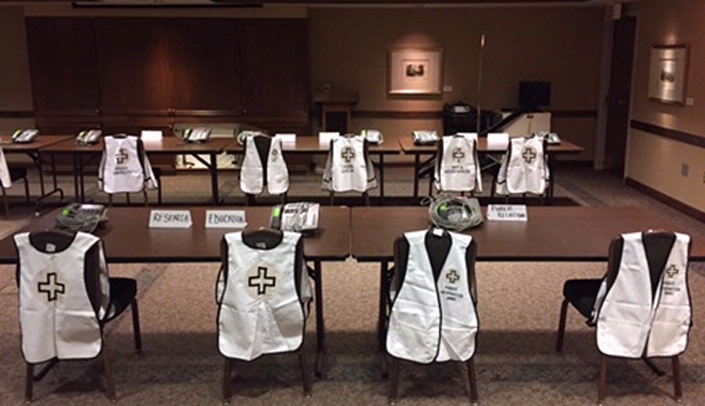Years of training paid off in 2014 when the Nebraska Biocontainment Unit team was called upon to treat patients with the Ebola virus.
That level of preparedness is key to dealing with an emergency situation.
What you can do
- In the event of an emergency, contact family members as soon as possible via phone, text or email so they are not left wondering if you are safe.
- Be prepared for Nebraska weather.
- Practice emergency drills. Know your escape route and where to head for shelter.
- Know where you can find university emergency information; program UNMC Security’s phone number into your mobile device.
- Be aware of your surroundings at all times.
- Have an emergency preparedness kit on hand.
- Sign up for UNMC Alerts/E2 Campus to receive emergency notifications from campus security. You can find more information about UNMC Alerts online. You can find a link to the sign up on the quick links page of the intranet. (View sign up instructions).
- Report behavior that raises safety concerns; remember “see something, say something.”
“People respond based on their experience and their ongoing training,” said UNMC Chancellor Jeffrey P. Gold, M.D. “Our biocontainment team is a perfect example of why it’s so important to train often, and well, before a crisis occurs.”
For that reason, more than 70 individuals from across the UNMC campus met Nov. 29 — one day after the attack on The Ohio State University campus — for a prearranged table top exercise to examine campus preparedness and resilience, and discuss how UNMC would respond and recover from a significant event.
Attendees included representatives from areas such as security, student affairs, public relations, facilities, research, information technology, environmental health and safety, finance and human resources, as well as the chancellor, vice chancellors, deans and directors.
The four-hour tabletop exercise, moderated by members of The Center for Preparedness Education, also included representatives from Nebraska Medicine, the University of Nebraska-Lincoln, University of Nebraska at Omaha, University of Nebraska at Kearney and University of Nebraska Central Administration.
“These exercises are incredibly valuable and raise the level of understanding and communication across all of our emergency teams,” said Rick Boldt, manager of disaster preparedness for UNMC. “We will continually assess, drill and adjust our emergency preparedness plans so that we are prepared when disaster strikes.”
Boldt encouraged all faculty, staff and students to prepare themselves and their families for emergencies that might occur on campus or off. “Developing a plan for you and your family is always time well spent,” he said.
